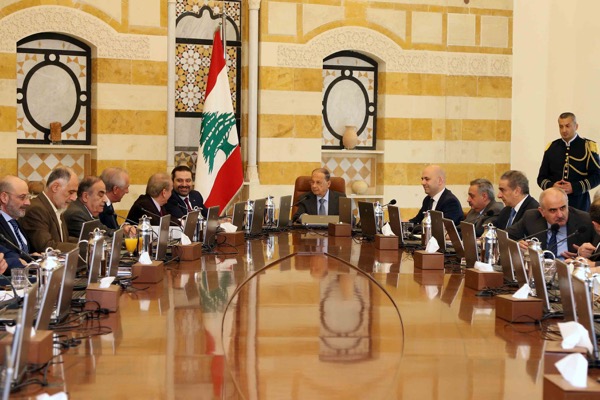
The Lebanese cabinet on Monday approved the 2017 state budget, the country’s first budget in 12 years.
The budget will be referred to the parliament for final ratification.
“The Cabinet approved the draft state budget and the deficit was greatly decreased through the debate that took place today,” Information Minister Melhem Riachi told reporters after the session.
“After the president and the PM return from the Arab Summit on Thursday, Finance Minister Ali Hassan Khalil will visit PM Hariri at the Grand Serail and will hold a press conference to announce all the details, numbers, the budget deficit, the decrease in the deficit, the revenues and the expenditure,” Riachi added.
“The session did not witness any dispute and the discussion took time because it involves numbers,” the minister noted.
Bassil comments
Speaking after a meeting of the Change and Reform bloc, Foreign Minister Jebran Bassil pointed out: “We underlined three old demands of the bloc namely the tax on real estate profits, raising taxes on bank profits and bank interests.”
The cabinet “has placed the first foundation for reform and financial regulation in the country. This is the first budget approved since 12 years,” he said.
Electricity reform plan
The proposed by Lebanon’s Energy Minister Cesar Abi Khalil was also approved by the government on Tuesday where its articles will be studied and approved individually by the cabinet.
In a session devoted to study the electricity-reform plan, the cabinet convened at the Presidential Palace in Baabda and was chaired by President Michel Aoun in the presence of Prime Minister Saad Hariri and the ministers.
After the session, Information Minister Melhem Riachi said: “A proposal put forward by the Energy Minister has been approved. It is part of an electricity plan that should have been completed back in 2010.
“A lot of comments were made about the plan which the Energy Minister took into consideration, especially with regard to the solicitation of bids and preparation of tenders.”
“The details of the plan and the preparations will be explained during a press conference to be held soon by Abi Khalil,” added Riachi.
Although the plan was approved, each of its articles will reportedly be studied and approved consecutively by the cabinet.
According to reports, Abi Khalil’s “Power Saving Plan” was proposed with the aim of improving electricity production.
Before the cabinet meeting began, State Minister for Parliament Affairs Ali Qanso voiced reservations over an earlier proposal by Lebanese Forces chief Samir Geagea to privatize the sector.
“We are not reassured about privatization. We are afraid of turning the commodity into a sectarian commodity,” he said.
Geagea has recently proposed that private companies should build and operate power plants in a partnership with the state in the electricity sector, describing it as a necessary reform that should be included in the state budget.
According to Geagea, such a step would provide a 24/24 power supply across the country and would spare the treasury around $2 billion in yearly subsidies.
Youth and Sports Minister Mohammad Fneish who represents hezbollah in the cabinet said: “We have some remarks about the electricity plan which will be brought up during the meeting.”
For his part, Minister of State for Planning Affairs Michel Pharaon said the plan will be approved “but there are some remarks to be taken into consideration.”
Abi Khalil’s plan suggests leasing three power generating Turkish vessels, instead of two already producing Lebanon’s electricity, to supply the country with needed power before the summer season begins.
Lebanon has been experiencing for several years daily power blackouts
According to energy observers privatization is the only way to solve Lebanon’s electricity problems. Abi Khalil’s plan that calls for leasing more Turkish power generating vessels means more subsidies and more dependence on Turkey and will never solve Lebanon’s problems according the observers. The observers pointed out that the private sector has been the only reliable source for electricity for Lebanon for decades

Leave a Reply
You must be logged in to post a comment.